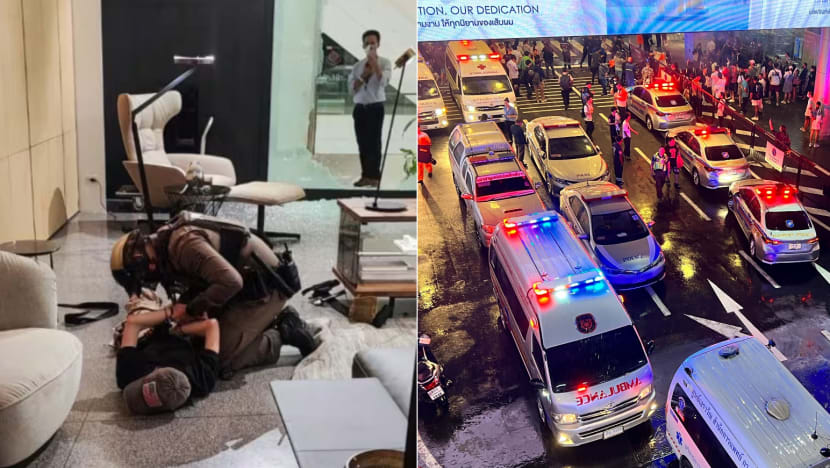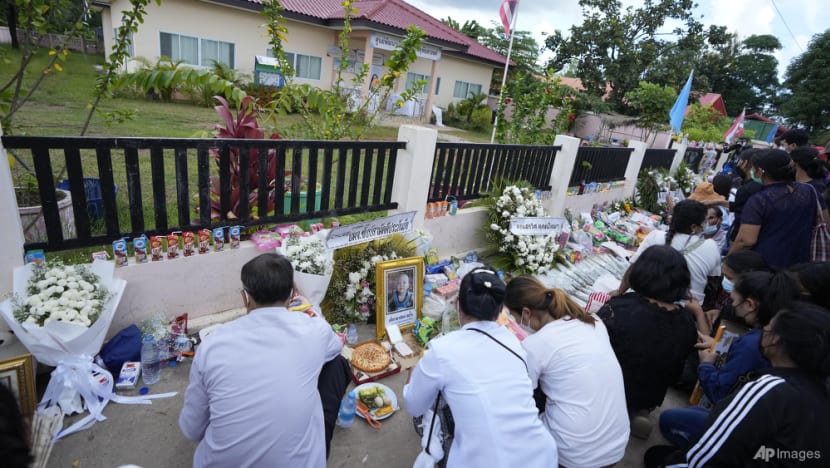Commentary: Gun violence is not Thailand's only silent crisis
There are plans for stricter gun laws after a Bangkok shopping mall shooting, but preventing future tragedies requires the Thai government to tackle other pressing issues too, says Boonwara Sumano of the Thailand Development Research Institute.

A suspected gunman is detained after shots were fired at the luxury Siam Paragon shopping mall in Bangkok, Thailand, Oct 3, 2023. (Photos: Reuters/Thai rescue workers association, CNA/Jack Board)
BANGKOK: Friday (Oct 6) marked the one-year anniversary of the gun and knife attack at a nursery in northeast Thailand, where 36 people, 24 of them toddlers, were killed by an ex-policeman with a history of drug abuse. In 2020, a military officer carried out a mass shooting at a shopping mall in Nakhon Ratchasima, resulting in 30 deaths and 58 injuries.
After both incidents, the then government announced numerous promises to reform gun control, which have remained unfulfilled so far. Thailand was reminded of this the hard way last week when a 14-year-old opened fire in popular shopping mall Siam Paragon in Bangkok.
The government of the day has already made fresh promises to reform the gun laws, which are expected to curb access, and has plans to block the sale and import of blank guns. But while the latest tragedy has put gun control in the spotlight, focusing narrowly on it obscures other problems that Thailand needs to tackle.
DON’T JUST TIGHTEN GUN CONTROL
Tightening gun laws may simply drive up the demand for illegal guns, if the government does not understand and address why so many Thais want to own guns in the first place.
According to Switzerland-based research centre Small Arms Survey, Thailand had 10.3 million guns in civilian possession in 2017 and one of the highest gun ownership rates in the world. But only around 6.2 million are registered, which means there are about 4 million illegal guns - a likely underestimation.
This behaviour is usually driven by structural issues, such as public safety, trust toward law enforcement agencies and cultural norms that perpetuate high tolerance for violence. During the July parliamentary session to decide on the prime minister, Member of Parliament Chada Thaiseth said he wanted to propose a new law that would allow people to shoot those insulting the monarchy. He is now the Deputy Minister of Interior, the main agency overseeing gun control.
So far, after all these shocking incidents, there has been no talk about structural reforms in these areas.

MENTAL HEALTH IN THE LAND OF SMILES
There is another pressing issue lurking beneath the surface, far less debated but equally threatening as gun control: Mental health.
The Siam Paragon shooter killed two people and injured several others using a blank gun modified to shoot real bullets. According to the police, the teenager had not taken his medication and suffered a psychological breakdown, seemingly “hearing things, a noise he said told him to shoot”.
The nursery gunman and military shooter were both reportedly under high levels of stress, with the former facing drug charges in court and the latter angry about a land dispute. That they had no record of mental health issues could perhaps be because they never sought any mental health care.
Instead of viewing these cases as isolated incidents, they should be seen as a reflection of a mental health crisis - a broader, structural problem just like gun violence.
Thailand may be known as the “Land of Smiles”, but there seems to be deep-rooted cultural norms of social harmony and non-confrontation that often lead to the suppression of emotional expression, particularly negative or conflicting ones.
Mental health is often seen as a sign of individual weakness when, in fact, it is a result of the inability to achieve well-being in society. This includes the lack of economic opportunities, education, healthcare, habitable environments and social connections, among other factors.
More Thais are seeking mental health services, with outpatient and inpatient attendances growing in recent years.
Even more alarming are the results of a Department of Mental Health survey, which found that children and youth aged below 20 years reported poorer mental health status than the national average and other age groups. From 2020 to 2022, the survey indicated that a staggering 24.3 per cent of Thai children and youth were grappling with high levels of stress, while 28.9 per cent were at risk of depression and 20 per cent were at risk of suicide.
Despite the increasing severity of the issue, mental health problems in Thailand have been neglected. The number of mental health professionals is far from sufficient to respond to the increasing demand. According to the Department of Mental Health, Thailand has 1.28 psychiatrists and 1.57 clinical psychologists per 100,000 population nationwide.
Disturbingly, while a higher proportion of children and youth reported experiencing mental struggles than in other age groups, there are only 295 child psychiatrists and 602 child psychiatric nurses. Distribution is another challenge, as some provinces have no access to specialised support.
BROADER CHALLENGES IN THAI SOCIETY
Even if there were a real change in the gun laws, letting the mental health crisis continue at this rate could still bring another tragedy, but involving other kinds of weapons: Knives, like in the 2022 nursery killings, or poison are easier to obtain compared to guns in Thailand.
Ultimately, similar to gun violence, the crisis of mental health in Thailand is not a standalone issue; it's intricately linked to the broader challenges facing our society. Creating a society with a safe and supportive environment can address both mental health and gun violence issues.
By addressing the root causes and providing much-needed support to the people, the government can prevent future tragedies and create a brighter future for Thailand. With World Mental Health Day on Oct 10, let us recognise that mental health deserves our attention, empathy and resources as much as other societal issues in Thailand.
Dr Boonwara Sumano is a senior research fellow at the Thailand Development Research Institute in Bangkok.



















